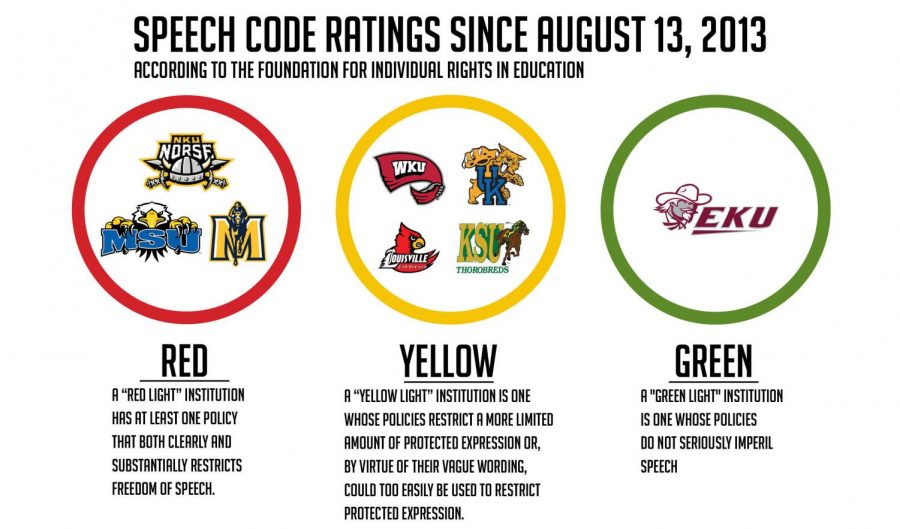What’s the Word? | Proceed with caution when speaking on WKU’s campus
October 20, 2015
A national foundation dedicated to free speech has categorized WKU as an institution whose speech policies are vaguely restrictive.
The Foundation for Individual Rights in Education (FIRE) categorizes universities in a Speech Code Rating System. The system informs viewers of FIRE’s opinion of the degree to which free speech is restricted at a particular institution.
WKU is currently categorized as a cautionary or “yellow light” institution for its assembly policy that restricts spontaneous demonstrations and assemblies.
“If you’re going to have a collection of people, you need to have a place to put them,” Vice President of Student Affairs Howard Bailey said. “You don’t want them out in the street.”
WKU currently allows “spontaneous speech, protests and distribution of literature in lawns, quads, grassy, park areas and similar spaces that are suitable for the purpose of public forums for WKU students,” according to the student handbook.
“You are welcome to have a protest in all areas of the campus,” Bailey explained, “so long as you’re not interrupting the educational process, and you’re not blocking walk or roadways.”
However, there are a number of places that require authorization prior to demonstrating, meeting or assembling: classrooms, libraries, work rooms, hallways, lobbies, administrative and faculty offices, lounges, entrances and exits of all university buildings, all streets and driveways utilized for vehicular traffic, residential buildings and all sidewalks utilized for pedestrian traffic.
Additionally, the following areas may only be utilized on a reservation basis: indoor facilities, intramural fields and other recreational areas, stadium and outdoor theatres and parking lots.
Jet Sheets is a member of Vegan Outreach, an organization that hands out flyers on college campuses around the country. He said he often has to deal with special rules on college campuses concerning distribution of literature.
“It’s a free speech country,” Sheets said. “It’s very discouraging to see, especially in higher education where people are supposed to be open-minded.”
Similarly, junior Mohammed Ganewy of Bowling Green said he doesn’t support the concept of a designated area for speech or assembly.
“I think all of campus should be a free speech zone,” Ganewy said.
WKU is not the only public institution in Kentucky that has been categorized on FIRE’s website.
Other “yellow light” public institutions in Kentucky include the University of Kentucky, Kentucky State University and the University of Louisville.
Eastern Kentucky University is the only Kentucky public institution to receive a “green light” rating for eliminating all of its speech codes in 2013 after EKU administrators worked closely with FIRE attorneys to ensure First Amendment compliance.
WKU has taken action in the past to create a more speech-tolerant campus. In 2013, WKU’s Student Government Association passed a resolution calling for WKU to change its Internet Usage Policy, citing a negative FIRE rating in the resolution. That policy was modified in 2014.
However, Bailey believes FIRE’s ongoing criticisms of WKU and other universities are not a high-priority concern, and WKU administrators take students’ First Amendment rights seriously.
“I don’t think [FIRE’s] interpretation is one that higher education needs to get too concerned about,” Bailey said. “We do everything that anyone would want done to defend and protect the First Amendment.”





















![Megan Inman of Tennessee cries after embracing Drag performer and transgender advocate Jasmine St. James at the 9th Annual WKU Housing and Residence Life Drag Show at Knicely Conference Center on April 4, 2024. “[The community] was so warm and welcoming when I came out, if it wasn’t for the queens I wouldn’t be here,” Inman said.](https://wkuherald.com/wp-content/uploads/2024/04/smith_von_drag_3-600x419.jpg)



